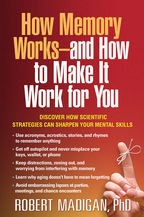How Memory Works—and How to Make It Work for You
Robert Madigan
HardcoverPaperbacke-bookprint + e-book
Hardcover
orderJune 10, 2015
ISBN 9781462520381
Price: $55.00 278 Pages
Size: 6" x 9"
Paperback
orderJune 11, 2015
ISBN 9781462520374
Price: $14.95278 Pages
Size: 6" x 9"
Do you wish you could recall the names of people you just met? What if birthdays, important errands, and online passwords rarely slipped your mind? Psychologist Robert Madigan is an expert in the “memory arts”—practical, proven methods for improving the ability to retain and use information. Like taking the stairs instead of the elevator, it's important to exercise memory in simple ways every day. That's where this science-based guide can help. Dr. Madigan explains how memory works and presents innovative mnemonic devices and visualization techniques that will help you sharpen your mental skills; avoid embarrassing lapses; and remember faces, appointments, facts, numbers, lists, and much more. Reclaim your brain—this book shows how.
“What sets this book apart from the pack is the breadth of its coverage and the fact that Madigan ties the mnemonic techniques he presents to supporting research and theory....Madigan...provides advice on practical matters such as remembering skills (e.g., sports, CPR), 'remembering life' (i.e., events in one's past), and 'remembering to remember' (i.e., prospective memory for things you need to do). Madigan touches on the effectiveness of memory training games and exercises presented on computers and mobile devices and mindfulness meditation, as well as physical exercise as a means of counteracting the effects of aging, topics that are novel, if not unique, in books on enhancing memory. Perhaps most intriguing (and original in this genre) is his examination of the relationship between mind-set and memory.”
—PsycCRITIQUES
“Madigan provides skills and techniques for improving memory function, using information gleaned from contemporary research as well as from ancient practices in oral tradition….He presents a compelling case for the utility of memory techniques in keeping the mind sharp.”
—Publisher's Weekly
“Anyone interested in how memory works—and what can be done to enhance our capabilities and offset our limitations—should run out and buy this book. Dr. Madigan has achieved a difficult combination: writing a book that is accessible and lively, but that also is based on research. He provides an engaging account of the 2,000-plus-year history of memory enhancement techniques and a step-by-step, how-to-do-it guide for readers who want to learn those techniques.”
—Robert A. Bjork, PhD, Distinguished Research Professor, Department of Psychology, UCLA
“A very readable, accessible 'owner’s manual.' Should we care about memory in this age of smart phones and mobile computing? Yes! Dr. Madigan engages with contemporary technology throughout the book and shows why it is still important to stay mentally fit. Many lapses we might blame on a 'poor memory' actually result from not using memory in ways that work. Exercises help readers apply the principles explained in each chapter—and experience the benefits.”
—Catherine Fritz, PhD, Department of Psychology, University of Northampton, United Kingdom
“I had the privilege of learning the memory arts firsthand from Dr. Madigan. The techniques he taught our class helped me excel in school and beyond. I recommend this book to anyone who is looking for the challenge and satisfaction of maximizing his or her mental capacity, or aspires to be independent of external memory aids. Prepare to be amazed by what your brain can do!”
—Benjamin Kelley, DO, resident ENT surgeon, Detroit Medical Center
“This book is unique in combining up-to-date scholarship, the insights of generations of memory experts, and powerful techniques to help you improve your own memory. The structure and writing style make the book easy and enjoyable to read. Even in an age when we can rapidly access facts from the Internet, there are many ways that developing better memory skills through practice can help us function more successfully.”
—Peter Morris, PhD, Department of Psychology (Emeritus), Lancaster University, United Kingdom
Table of Contents
Introduction: The Art and Science of MemoryI. The Basics
1. Four Ways of Remembering
2. Working Memory: It's Short-Term Memory and More
3. Attention: "The Secret of Good Memory"
4. How Dragons Make Strong Memories
5. How We Recall Memories
II. Memory Applications
6. Paths to Better Memory
7. Remembering Names
8. Remembering to Remember
9. Remembering Facts
10. Remembering Numbers
11. Remembering Skills
12. Remembering Life
13. The PARIS Mnemonics
14. The Memory Palace
15. Mindsets and Memory
Notes
